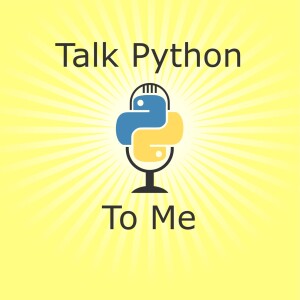
#338: Using cibuildwheel to manage the scikit-HEP packages
 2021-10-17
2021-10-17
Download
Right click and do "save link as"
How do you build and maintain a complex suite of Python packages? Of course, you want to put them on PyPI. The best format there is as a wheel. This means that when developers use your code, it comes straight down and requires no local tooling to install and use.
But if you have compiled dependencies, such as C or FORTRAN, then you have a big challenge. How do you automatically compile and test against Linux, macOS (Intel and Apple Silicon), Windows, and so on? That's the problem cibuildwheel is solving.
On this episode, you'll meet Henry Schreiner. He is developing tools for the next era of the Large Hadron Collider (LHC) and is an admin of Scikit-HEP. Of course, cibuildwheel is central to this process.
Links from the show
Sponsors
Talk Python Training
AssemblyAI
view more
But if you have compiled dependencies, such as C or FORTRAN, then you have a big challenge. How do you automatically compile and test against Linux, macOS (Intel and Apple Silicon), Windows, and so on? That's the problem cibuildwheel is solving.
On this episode, you'll meet Henry Schreiner. He is developing tools for the next era of the Large Hadron Collider (LHC) and is an admin of Scikit-HEP. Of course, cibuildwheel is central to this process.
Links from the show
Henry on Twitter: @HenrySchreiner3
Henry's website: iscinumpy.gitlab.io
Large Hadron Collider (LHC): home.cern
cibuildwheel: github.com
plumbum package: plumbum.readthedocs.io
boost-histogram: github.com
vector: github.com
hepunits: github.com
awkward arrays: github.com
Numba: numba.pydata.org
uproot4: github.com
scikit-hep developer: scikit-hep.org
pypa: pypa.io
CLI11: github.com
pybind11: github.com
cling: root.cern
Pint: pint.readthedocs.io
Python Wheels site: pythonwheels.com
Build package: pypa-build.readthedocs.io
Mac Mini Colo: macminicolo.net
scikit-build: github.com
plotext: pypi.org
Code Combat: codecombat.com
clang format wheel: github.com
cibuildwheel examples: cibuildwheel.readthedocs.io
Cling in LLVM: root.cern
New htmx course: talkpython.fm/htmx
Watch this episode on YouTube: youtube.com
---------- Stay in touch with us ----------
Subscribe on YouTube (for live streams): youtube.com
Follow Talk Python on Twitter: @talkpython
Follow Michael on Twitter: @mkennedy
Henry's website: iscinumpy.gitlab.io
Large Hadron Collider (LHC): home.cern
cibuildwheel: github.com
plumbum package: plumbum.readthedocs.io
boost-histogram: github.com
vector: github.com
hepunits: github.com
awkward arrays: github.com
Numba: numba.pydata.org
uproot4: github.com
scikit-hep developer: scikit-hep.org
pypa: pypa.io
CLI11: github.com
pybind11: github.com
cling: root.cern
Pint: pint.readthedocs.io
Python Wheels site: pythonwheels.com
Build package: pypa-build.readthedocs.io
Mac Mini Colo: macminicolo.net
scikit-build: github.com
plotext: pypi.org
Code Combat: codecombat.com
clang format wheel: github.com
cibuildwheel examples: cibuildwheel.readthedocs.io
Cling in LLVM: root.cern
New htmx course: talkpython.fm/htmx
Watch this episode on YouTube: youtube.com
---------- Stay in touch with us ----------
Subscribe on YouTube (for live streams): youtube.com
Follow Talk Python on Twitter: @talkpython
Follow Michael on Twitter: @mkennedy
Sponsors
Talk Python Training
AssemblyAI
More Episodes
#482: Pre-commit Hooks for Python Devs
 2024-10-24
2024-10-24
 2024-10-24
2024-10-24
#478: When and how to start coding with kids
 2024-09-25
2024-09-25
 2024-09-25
2024-09-25
#477: Awesome Text Tricks with NLP and spaCy
 2024-09-20
2024-09-20
 2024-09-20
2024-09-20
#476: Unified Python packaging with uv
 2024-09-04
2024-09-04
 2024-09-04
2024-09-04
#475: Python Language Summit 2024
 2024-08-24
2024-08-24
 2024-08-24
2024-08-24
#474: Python Performance for Data Science
 2024-08-19
2024-08-19
 2024-08-19
2024-08-19
#473: Being a developer with ADHD
 2024-08-02
2024-08-02
 2024-08-02
2024-08-02
#472: State of Flask and Pallets in 2024
 2024-07-26
2024-07-26
 2024-07-26
2024-07-26
#471: Learning and teaching Pandas
 2024-07-22
2024-07-22
 2024-07-22
2024-07-22
#470: Python in Medicine and Patient Care
 2024-07-12
2024-07-12
 2024-07-12
2024-07-12
#468: Python Trends Episode 2024
 2024-07-01
2024-07-01
 2024-07-01
2024-07-01
#467: Data Science Panel at PyCon 2024
 2024-06-20
2024-06-20
 2024-06-20
2024-06-20
#466: Pydantic Performance Tips
 2024-06-14
2024-06-14
 2024-06-14
2024-06-14
#465: The AI Revolution Won't Be Monopolized
 2024-06-08
2024-06-08
 2024-06-08
2024-06-08
012345678910111213141516171819
Create your
podcast in
minutes
- Full-featured podcast site
- Unlimited storage and bandwidth
- Comprehensive podcast stats
- Distribute to Apple Podcasts, Spotify, and more
- Make money with your podcast
It is Free
- Privacy Policy
- Cookie Policy
- Terms of Use
- Consent Preferences
- Copyright © 2015-2024 Podbean.com


